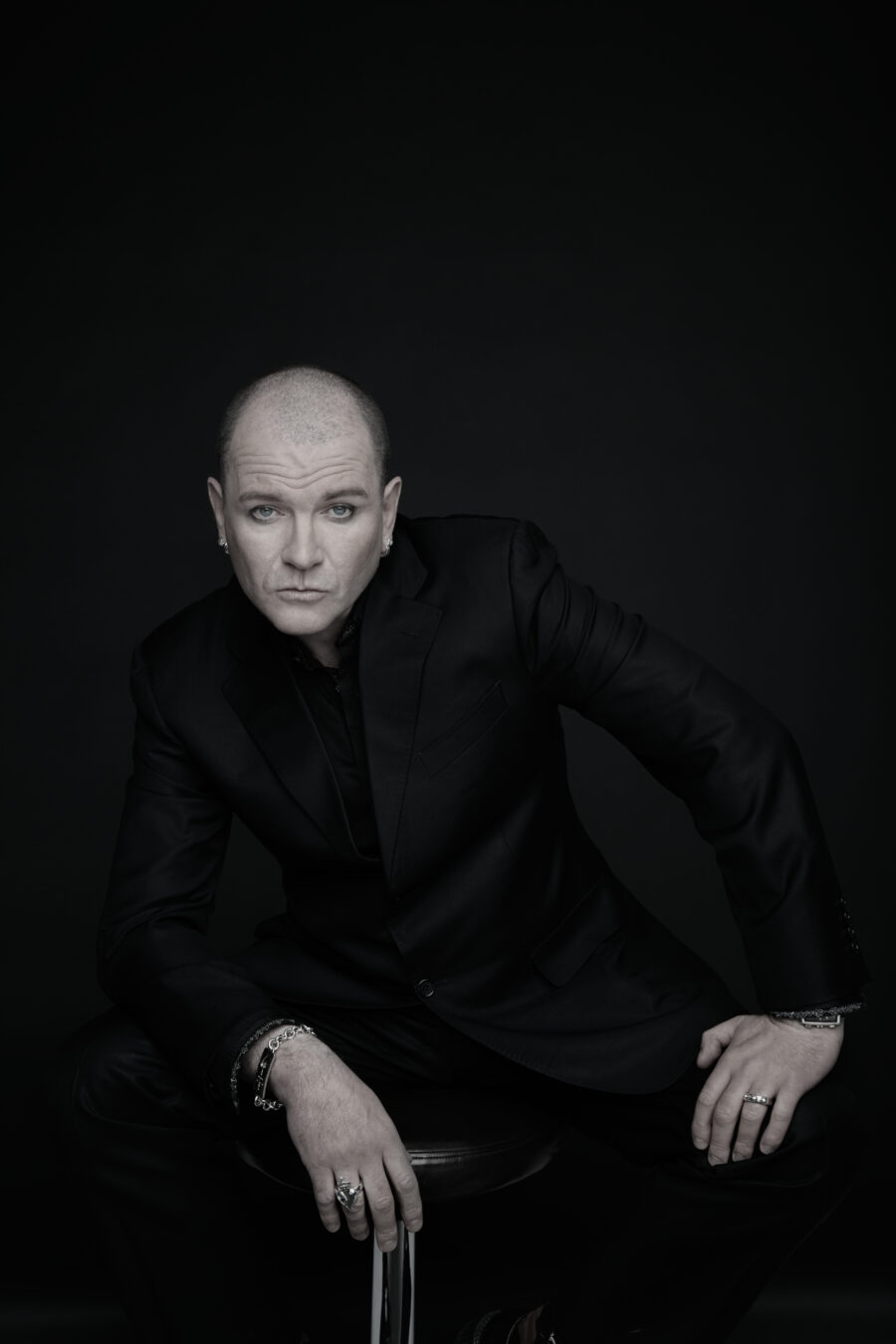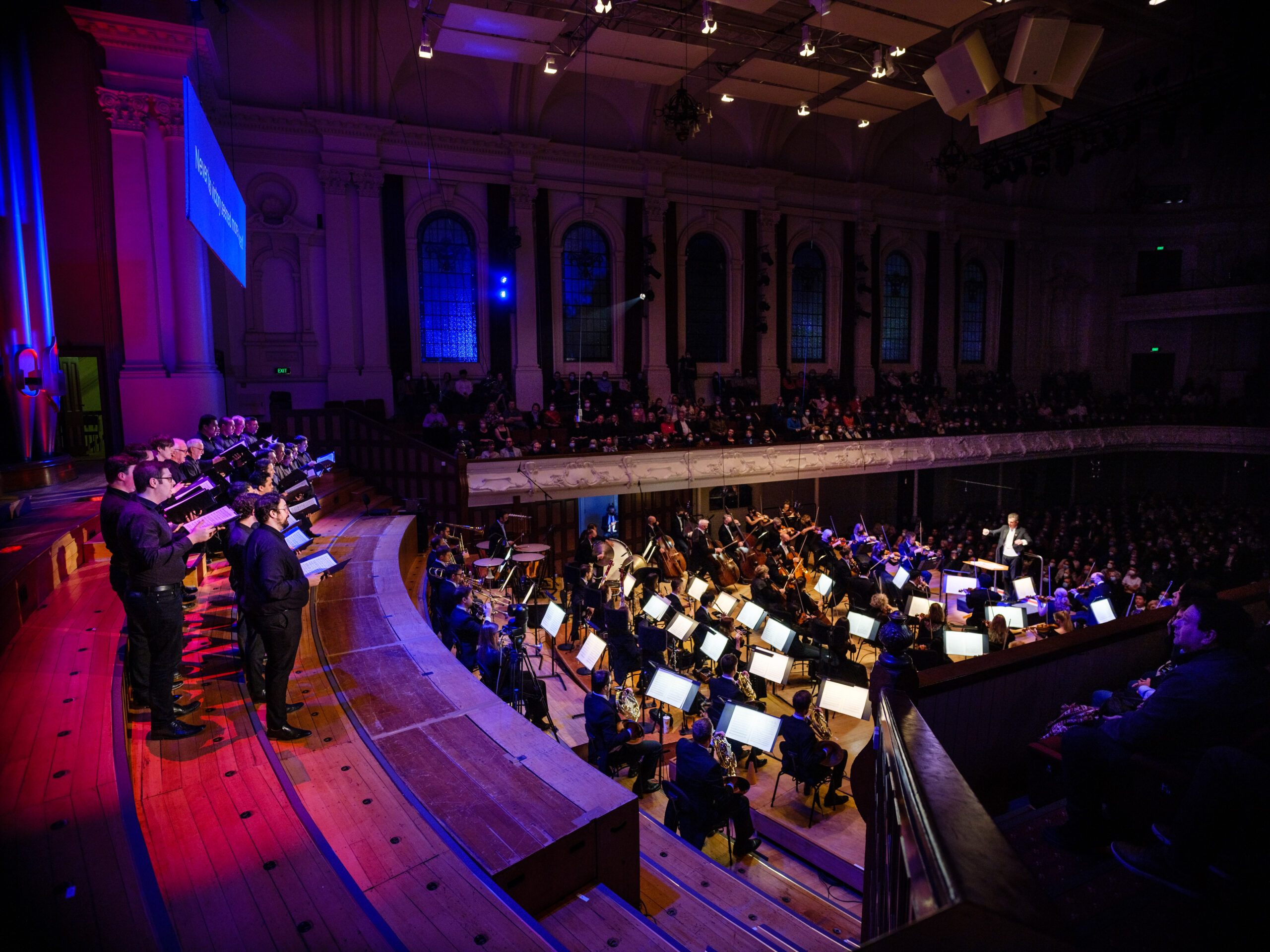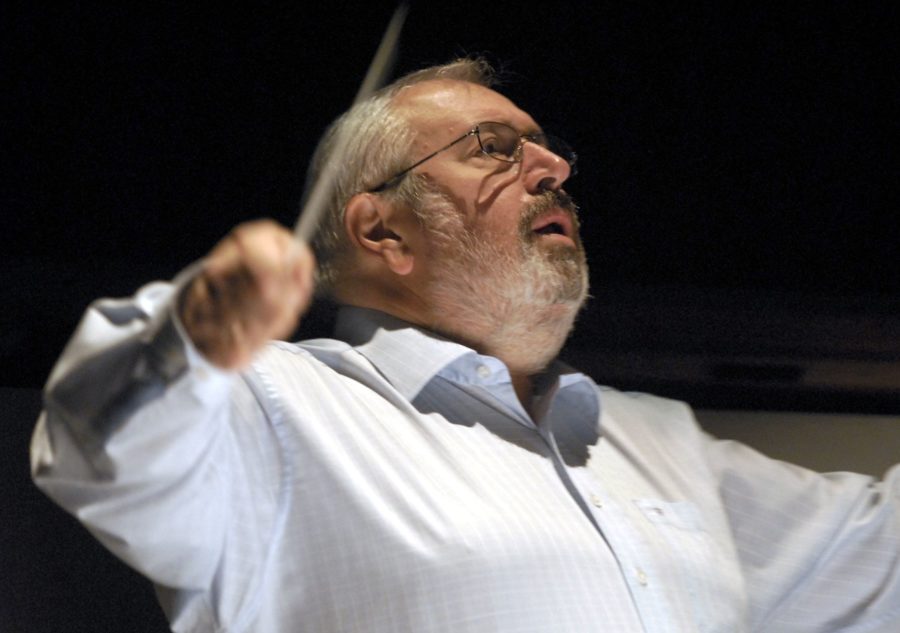Everyone comes to Peter And The Wolf in their own way, but there’s a good chance many may now be introduced to the Prokofiev classic through a new animated short. Reimagining a beloved Russian classic is no small thing, but such bold creativity seems par for the course if one considers the man behind its realization.
Musician, actor, painter, performer, producer, poet, muse; it’s impossible to put Gavin Friday in a box, and one suspects that’s just how he likes things. The Irish artist, a founder of avant-garde band The Virgin Prunes and an accomplished solo musician, spent the better part of the 2020 pandemic lockdown thinking about wolves, family, one little boy – and how the drawings of a longtime childhood friend could work with all of it. That friend is, as many know, Bono, someone with whom he has maintained a decades-long connection which began in North Dublin in the mid 1970s. Born Fionan Hanvey, he met Bono (Paul Hewson) and future Virgin Prunes colleague Guggi (Derek Rowen) at a house party in his teens. The Virgin Prunes (active between 1977 and 1986) were a thing apart in Dublin – and elsewhere, really– with The Irish Times describing the band in 2022 as “right in the middle of grand guignol performance art, melodic lucidity, and hard-as-nails post-punk“; their daringly theatrical presentations and fusion of genres set Friday up for an assortment of future creative pursuits. Following his time with the band Friday released four solo albums, with many respective tracks strongly influenced by the work of Jacques Brel and Serge Gainsbourg: Each Man Kills the Thing He Loves (1989); Adam ‘n’ Eve (1992); Shag Tobacco (1995), and catholic (2011). He’s held art exhibitions, sound installations, and contributed to numerous film scores and soundtracks, including Jim Sheridan’s In The Name Of The Father (1993), The Boxer (1997), and In America (2003). In 2005 Friday acted opposite Cillian Murphy in Breakfast On Pluto, Neil Jordan’s adaptation of Patrick McCabe’s 1998 novel of the same name, and in 2007 contributed music to McCabe’s theatre piece The Revenant, which opened that year’s Galway Arts Festival.
2007 also saw Friday also work with English composer Gavin Bryars on a new version of Shakespeare’s Sonnets together with the Royal Shakespeare Company and Opera North, a project he referenced more than once through the course of a recent conversation. Other collaborators have included Quincy Jones, Hal Willner (the latter produced Friday’s first two solo albums), post-punk artists Mark E. Smith, Dave Ball, and members of The Talking Heads, electronic music artists Howie B. and Atonalist, as well as Sinead O’Connor, whom he recently eulogized in a year-end special for The Observer (sister paper to The Guardian). Perhaps most famously, Friday has acted as longtime creative consultant to U2 (he calls himself their “midwife“), notably within the realm of their ambitious live presentations.
And then there is Peter And The Wolf, the legendary Prokofiev work of which Friday is a longtime fan. Originally commissioned in early 1936 by Natalya Sats, director of the Central Children’s Theatre in Moscow, the story revolves around a boy who lives with his grandfather and eventually traps a wolf with the help of forest-dwelling friends. The work premiered in the Large Hall of the Moscow Conservatory that same year, with its American premiere presented in 1938. Friday had narrated a formal orchestral presentation in Dublin in the early 2000s; that performance morphed into a book-and-CD project (published by Bloomsbury) in aid of the Irish Hospice Foundation in 2003, with musical rearrangement by Friday and longtime collaborator Maurice Seezer and artwork by Bono. Resemblances between the fairytale world of Peter and the Hewson clan were not, as Friday shared recently, accidental, and are most pronounced via the character of Grandfather, sketched in the book and the new animated short as Bono’s own father, Bob Hewson, who had been under the hospice’s care until his passing from cancer in 2001.
The new project, produced by BMG and animation studio Blink Industries, brings the drawings to poetic life with thoughtful narrative expansions and moments of true, unfiltered joy. There’s a sometimes fine but important difference between cute and contemplative, childish and childlike, and the thirty-minute work, directed by Stephen McNally and Elliot Dear, gets the balance just right. The musical rearrangement recalls the angular sounds of Tom Waits, Nick Cave, and Krzysztof Penderecki; it is an intelligent fusion of spiky textures, careful momentum, and Prokofiev’s folkloric melodicism. Connecting it all is Friday’s warm narration, injected with alternating doses of tension and tenderness. His accompanying song for the project, “There’s Nothing To Be Afraid Of“, is a touching (and very earworm-worthy) epilogue. This new Peter And The Wolf is as much a band-aid to sorrow as a pure hymn to happiness, a tribute to Prokofiev’s original and an ambitious broadening of the parameters binding its long-known universe. It is also a testament to the incredible breadth of Friday’s ambitions and talents. Released in October on the streaming platform MAX in North America and comes with a new book as well as a soundtrack in CD and vinyl formats. Peter And The Wolf airs on Irish national broadcaster RTE One on December 25th.
Between promoting the new Peter And The Wolf short, mixing his much-anticipated new album (working title: Ecce Homo), and overseeing the remastering and re-release of works by The Virgin Prunes, Friday is a busy man who seems more inspired and curious than ever. Might opera – in some form or fashion – be in Friday’s future? He isn’t talking, but Peter And The Wolf certainly cements his position as a go-to man for all things musicodramatitheatre. One can hardly wait for Friday’s next act.
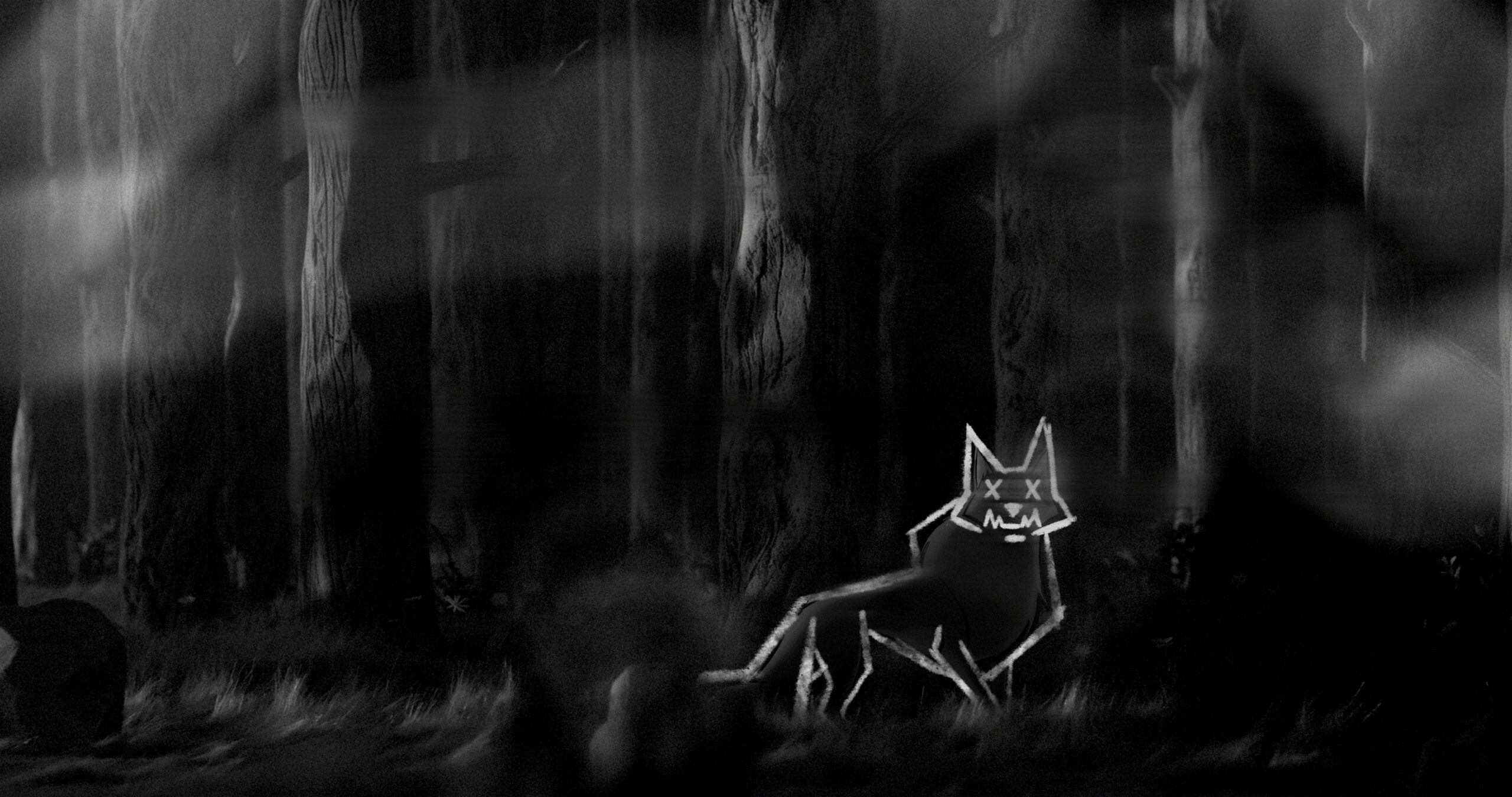
A frame from Peter And the Wolf. Photo: Blink Industries
How did this version of Peter And The Wolf come about?
The piece it’s based on celebrated its 20th anniversary this past autumn – that book-and-CD project did really well and we put it to bed, though there was a suggestion of animating it at some stage. About five years ago we got the rights to the recording back and I thought, “Wow, we should re-release this, stream it, look after it.” At the same time, (BMG’s UK President, Repertoire & Marketing) Alistair Norbury rang me up asking, “Is there a new Gavin Friday album coming? Or would you be interested in doing some re-releases?” We met in London and I mentioned getting the music rights back, and he said, “Why don’t we look at animating it?” We set up a few meetings and the animators we embraced the most belonged to a British company called Blink Industries. Then we went back to the Irish Hospice Foundation; since it was created for them originally, it would be so again.
What was the biggest challenge?
To try and animate Bono’s drawings was really the big conundrum; I didn’t want them to be overly nice or homogenized. I wanted them to have a punky aesthetic, that same scratched-up look as the book. Bono said, “Look, you curate them, and once it’s to your taste, I’ll give it my blessing.” So we started developing characters and came up with a little five-minute trailer, like a demo, and we went around to a few companies, and HBO fell in love with it. And we started meetings with them – but just around then, as we started getting going, lockdown came in and the whole world went into quietness. HBO said, “We can still start development via Zoom, so why don’t we?” Also we had a great team at HBO – which since became MAX – but they did remind us that twenty years ago was a different world so we’d have to edit the words in the old text, since it has Dublinese nuances and influences.
Going back to the early 2000s: how did the very first project transpire?
I had been working with the Irish Hospice Foundation for the last 25 years – they came and asked me for innovative stuff for charity rather than simply, “Here’s a daffodil; here’s a calendar” – we have done various projects together including cards and books and so on. At one stage they told me about a children’s orchestra in the Royal Hibernian Academy of Arts and how they’d love to do something with me for charity, and I said, “Why don’t we do Peter And The Wolf?” That’s how it started. As you know Prokofiev wrote this in 1936 for children; the instruments of the orchestra are meant to be characters. And everyone knows the story…
I’ve introduced students to it through the years and nearly all of them have never heard of it.
Really?! Maybe it’s because I’m European so I know it – it’s a Russian fairytale but everyone I know is aware of and loves it!
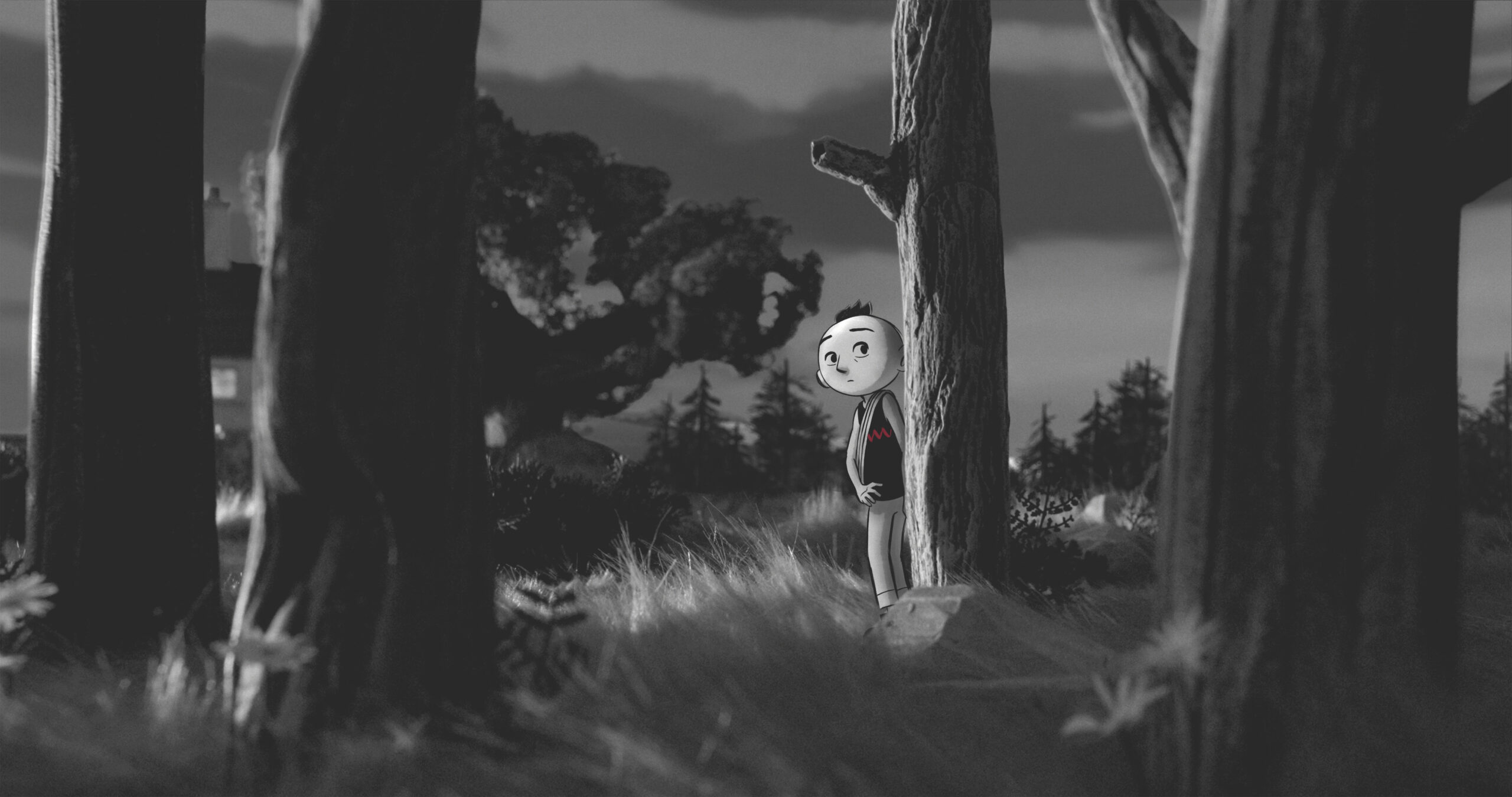
A frame from Peter And the Wolf. Photo: Blink Industries
What’s your very first memory of Peter And The Wolf?
I heard Danny Kaye’s version – it was one of my aunt’s vinyls. But I’d heard it being played on the radio and things like the Proms and other specials; the BBC are quite good at classical. But I really woke up to it with David Bowie’s version, though I didn’t actually like that one! But the overall idea, yes, I love the gothic-ness of the story, the wolf and all that. So when it came to me performing it with this orchestra, it was a straightforward, live presentation with student musicians. We did it at the concert hall and it was a success. After that I wondered about doing our own arrangement. You know how, when you jump into something that’s new, or not-entirely new to you, you really really go for it? Whether it’s Stravinsky or whatever, you just go, “Oh Jesus, so much to learn! So much to listen to! So much to read!” – maybe too much! It happened when I was working with Gavin Bryars for the first time on the sonnets. With Shakespeare I had done this (gives middle finger) all my life – I think that’s an Irish thing – but when you read the sonnets you go, “Oh my Jesus, this guy’s a genius! Why haven’t I been reading this all my life?! Oh but wait, it’s so bloody much to learn…!”
So that obsessive streak happened with Peter And The Wolf?
… yes, I got very obsessive. I got hold of every version I possibly could. I think I have about 40 different recordings of it now; the Dame Edna one is brilliant, but one of my big favourites is by Sean Connery – what a gorgeous voice. When I did it with the orchestra in Dublin I did notice that the kids weren’t terribly interested, though – well, they were interested in my story, and how I was going into the wolf voice, but the music didn’t entirely engage them, so I thought, “Okay, it’s no longer an interesting thing on its own for kids, it has to be something they want to hear.” So when we went to do the 2003 version I said, “Let’s treat it was a movie score, let’s imagine we’re orchestrating and arranging this for a Tim Burton movie.” We had just started a big Kurt Weill show in Dublin and we were using banjos and horns; I thought maybe we could use them for the rearrangement – like, go punky on it, and so we did. We recorded it in two days in Dublin with some wonderful musicians. We had to send it to Prokofiev’s son for approval – he absolutely loved it – and we met (grandson) Gabriel Prokofiev for drinks as well; he thought it was punky, dangerous, and said, “It’ll get kids listening.” We embraced that; it’s what we wanted. Rather than saying, ‘The bird is the flute, the clarinet is the cat’ we say: this is what music and theatre are. We got the sign-off from the Prokofiev family again for the new animation.
How was that 2003 version realized in 2023?
HBO said they wanted the project and they had no problems with the music. They did want Bono’s voice and I said no, but since he had done the original drawings, I wondered, “How do I get him into this without speaking?” – which is a hard thing, I have to say! (laughs) There’s this old video of Picasso painting in front of a piece of glass, so we used that idea as a prologue; you see Bono painting the wolf and it morphs into Peter in the car, and then he does a little reprise at the end. It makes everyone happy that he’s in it, but without him actually speaking. We also had to change certain points of the story, particularly the ending. There’s a bit of ambiguousness in the original; the wolf is carted off, but where’s he going? Kids especially want to know: did they hurt the wolf? Is he dead? But wait, is the wolf really a “he” or is it a “she” or what? The HBO/Max team asked me and I thought, hmmm…
I reread the 2003 book recently and thought certain phrases probably wouldn’t work today – especially how you describe the wolf going “mental” when he’s caught.
Yes, and that’s a real Dublinism – but it had to be removed. The real thing that tipped my head was the question of why Peter lives with his grandfather. I thought, “Okay, this is for the hospice: his mother died, he’s dealing with loss. He’s coming from his mum’s funeral; you see pictures of her at some point – these are little symbols that say everything.” As to the wolf, well, what is it? Really, it is fear, at its essence. When horrible shit happens, like a parent dying – which is your whole world if you’re a kid – that’s the wolf. So we made Bono’s chalky drawing outside the box; the real wolf is in there, but you only see this white shape, which makes it otherworldly and surreal. It’s how Peter sees the world. We went through the whole process of rewriting and animating for basically a year. I am not a fan of digital animation personally, so all the sets were built, they’re handmade – so small trees, the car is a small car, they made little chairs, and it all mixes with 2D. The result is, I think, very beautiful.
It keeps the theme of the journey to adulthood intact also.
Yes, along this journey Peter befriends his grandfather; the wolf brings them together. It’s making what was an old piece of Russian folklore that Prokofiev put to music into this balm on how to deal with fear and loss. There was a question in terms of the narration; at the start the animators wisely said to me, “You’re taking the persona of the duck and the wolf and speaking the parts, but what about you as a narrator? What are you, exactly?” And they came up with a new character, a fly who hops around and sits on Peter’s shoulder and buzzes around as the wolf is being caught. The fly-narrator is me, this dandy version of Jiminy Cricket.
That inclusion facilitates narrative clarity, but it made me wonder if you’d be open to doing more classical-theatre-type work – I think you’d be perfect for Stravinsky’s L’Histoire Soldat, and Henze’s Aristaeus, for instance.
Well there’s a lot coming from me yet! When lockdown happened this landed on my plate – I was going to mix my album that I am finally mixing now. Peter And The Wolf did become a focus during lockdown, and I just fell in love with it. Building the story and working on the sets, the scripting going on – it was my first really big venture into narrative performance in a public way, and in retrospect it was a beautiful way to get through lockdown. The biggest thing I’ve done other than this is Nothing Like The Sun with Gavin Bryars, who picks it up and tours it every now and again. When I first did it I worked with the Royal Shakespeare Company for a month, which was hard-going. But people still ask me, why be so theatrical in all of your work? Well, because I’m interested in telling stories – it’s taking a character, it’s acting, having fun. I’m in my 60s, and I think, for f**k’s sakes, I still have a lot of stuff I want to do – when I’m 75 I might not be able to, so now’s the time!

